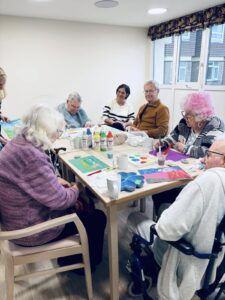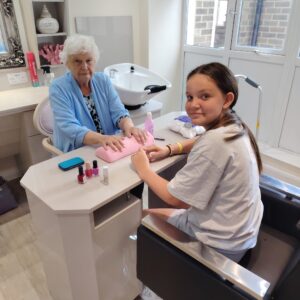Are you and your loved ones preparing for the transition to assisted living? We understand that this can be a daunting and emotional journey. But fear not!
In this article, we’ll share valuable tips and insights to help make the transition as smooth as possible. From choosing the right facility to settling into your new home, we’ve got you covered.
Let us guide you through this process with our knowledgeable and empathetic advice. Together, we can create a supportive network and ensure a seamless transition.
Key Takeaways
– Consider the level of care provided and evaluate amenities offered when choosing an assisted living facility.
– Prepare mentally and emotionally for the move by acknowledging fears and concerns and engaging in open and honest conversations.
– Provide emotional support and reassurance, and seek professional counselling if needed, to manage emotional and practical challenges during the transition.
– Build a supportive network of friends and family, seek emotional support and understanding, and coordinate logistics with loved ones to create a supportive environment during the transition.
Choosing the Right Assisted Living Facility
When choosing the right assisted living facility, it’s important to consider the level of care provided and the amenities offered. We understand that this decision can be overwhelming, but rest assured we’re here to guide you through it.
The level of care provided should meet your specific needs, ensuring that you receive the assistance and support required for daily activities. From medication management to help with personal hygiene, a good assisted living facility should prioritise your well-being.
Additionally, take into account the amenities offered by each facility. Do they have recreational activities? Are there communal areas for socialising? These aspects contribute to a fulfilling and engaging lifestyle in your new home.
Preparing Yourself and Your Loved One for the Transition
To ensure a seamless adjustment, we should take the time to mentally and emotionally prepare ourselves and our loved ones for transitioning into assisted living.
Moving into a new environment can be overwhelming, especially for seniors who may have lived in their homes for many years. It’s important to acknowledge and validate any fears or concerns they may have about this transition.
Engaging in open and honest conversations about the move can help alleviate anxiety and provide reassurance. Additionally, it’s beneficial to visit the assisted living facility together beforehand, allowing your loved one to familiarise themselves with the surroundings and meet staff members.
Managing Emotional and Practical Challenges
You may feel overwhelmed by the emotional and practical challenges that arise when transitioning to a new living arrangement. Moving to assisted living can be a significant change, both for the individual and their loved ones. It is important to acknowledge and address these challenges in order to make the transition as smooth as possible.
Emotionally, it is common to experience feelings of sadness, loss, or anxiety during this time. It is essential to provide emotional support and reassurance to your loved one throughout the process. Encouraging open communication can help them express their concerns and fears.
Practically, there are several steps you can take to ease the transition. Start by researching different assisted living facilities and visiting them together with your loved one. This way, they can get a sense of what each place offers and have a say in their new home.
Additionally, involve your loved one in decision-making processes such as downsizing belongings or choosing furniture for their new space. By including them in these decisions, you empower them and help maintain a sense of control over their life.
Lastly, don’t forget about self-care during this time. Taking care of yourself will enable you to better support your loved one during this transition period. Seek out support groups or counselling if needed – remember that you’re not alone on this journey.
Creating a Supportive Network
Building a supportive network of friends and family can play a crucial role in navigating the challenges of transitioning to a new living arrangement.
We understand that moving into assisted living can be overwhelming, and having a strong support system can make all the difference.
Friends and family members can provide emotional support during this transition period, offering reassurance and understanding. They can also help with practical aspects such as packing, organising, and coordinating logistics.
Additionally, they can assist in researching and visiting potential facilities, ensuring that you find the best fit for your needs.
By creating this network of support, you not only have people to lean on during difficult times but also individuals who will celebrate your successes along the way.
Settling into Your New Home
Once you’ve moved in, it’s important to take some time to get familiar with your new surroundings and make it feel like home. Adjusting to assisted living can be a big change, but there are steps you can take to settle in smoothly.
Start by exploring the facility and getting acquainted with the amenities available to you. Take a walk around the grounds, visit common areas, and introduce yourself to staff members and fellow residents.
Personalise your living space with familiar belongings and decorations that bring you comfort. Don’t hesitate to ask questions or seek assistance if needed – the staff is there to support you during this transition.
Remember that it takes time to adjust, so be patient with yourself as you navigate this new chapter of your life.
Frequently Asked Questions
What should I do with my loved one’s belongings when transitioning to assisted living?
When transitioning to assisted living, we should discuss with our loved ones what belongings they want to keep. We can consider donating or selling items they no longer need and find storage solutions for sentimental items.
How can I ensure that my loved one receives proper medical care in an assisted living facility?
First and foremost, it’s crucial to thoroughly research the assisted living facility. We must ensure our loved one receives proper medical care by asking about their staff-to-resident ratio, medication management protocols, and healthcare services available on-site.
What can I do to maintain a sense of independence for my loved one while in assisted living?
To maintain a sense of independence for our loved ones in assisted living, we can encourage them to participate in decision-making, engage in activities they enjoy, and create a personalised care plan that respects their preferences and abilities.
Are there any financial assistance programs available for assisted living expenses?
Yes, there are financial assistance programs available for assisted living expenses. These programs can provide support and resources to help alleviate the financial burden of transitioning to assisted living.
How do I address any concerns or complaints about the assisted living facility?
If you have concerns or complaints about the assisted living facility, we recommend addressing them directly with the staff or management. They are there to listen and help resolve any issues you may have.
Conclusion
In conclusion, folks, making the transition to assisted living can be a real hoot!
Just imagine all the fun you’ll have to choose the perfect facility and prepare yourselves for this new adventure.
And don’t forget about managing those emotional rollercoasters and practical challenges – it’s like navigating a thrilling obstacle course!
But fear not, because with a supportive network by your side, you’ll soon settle into your new home like pros.
So embrace this opportunity with knowledge, empathy, and excitement – assisted living is where the party’s at!
If you have any concerns that weren’t found here take a look at our Guides Page!






